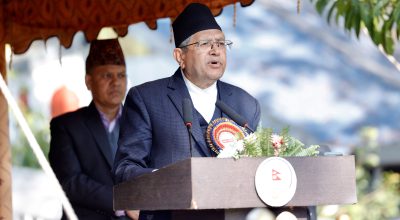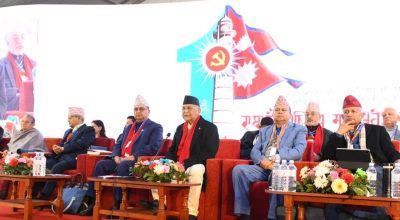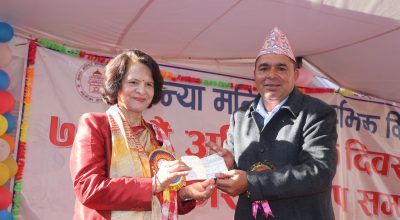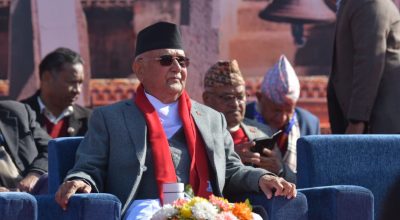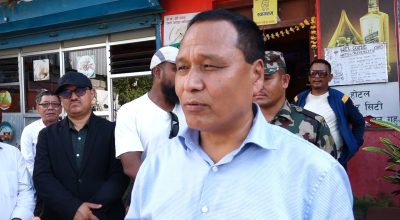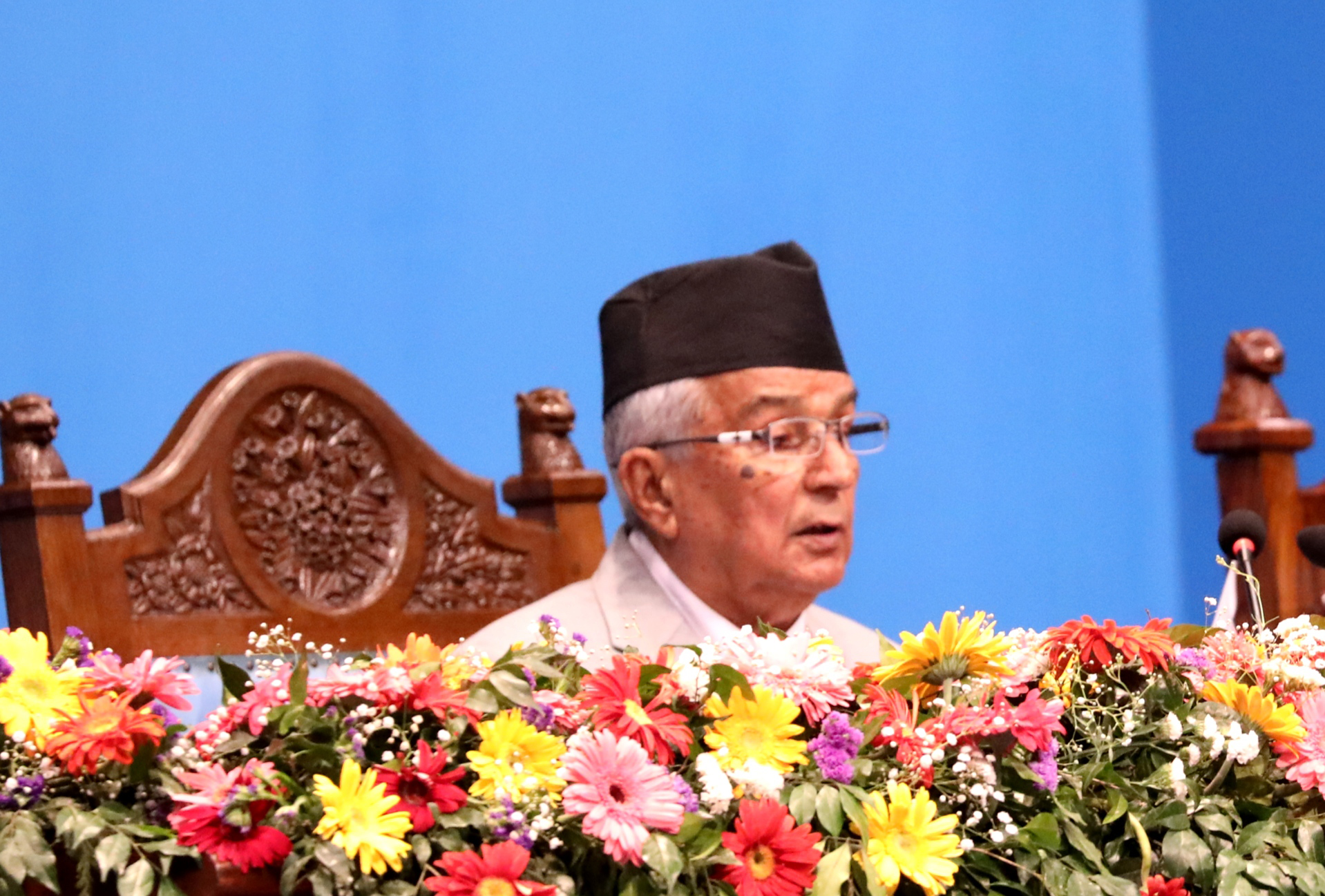
Kathmandu, May 14: President Ram Chandra Paudel has said that the current government has moved forward with determination for improving the political, social and economic environment of the country, despite minor changes in political developments after the second general election following the promulgation of the Constitution of Nepal.
Presenting the policies and programs for next fiscal year 2024/25 at the joint session of the federal parliament on Tuesday, President Paudel further said, “Coordination and cooperation among federal units has been strengthened through the National Coordination Council. The jurisdiction of the three-tier governments has been further clarified by reviewing the existing unbundling of the list of powers.
There has been a gradual improvement in the economy through harmonized implementation of fiscal and monetary policy. Improvement in economic growth has been witnessed compared to the previous fiscal year, he said.
Overall investment climate has been improved by amending relevant laws. There is adequate investable capital in the banking and financial system. The bank interest rate has come down.
The current account, which was in deficit for a long time, is in surplus, and the balance of payment remains positive. The foreign exchange reserve has reached all-time high. Tourist arrival has substantially increased compared to the previous year. Per capita tourist expenditure has increased.
Production of agricultural crops including paddy has increased due to timely supply of seeds and fertilizers.
Emphasis has been made on the optimum mobilization of the means of production of the agriculture sector.
Irrigation facility has been expanded to additional three thousand hectares of land in the current fiscal year. A 13.2 kilometer-long tunnel boring of Sunkoshi-Marin Diversion Project has been completed ahead of scheduled timeframe.
Installed hydropower 2940 MW
Installed hydropower capacity has reached 2940 megawatts. A total of 98 per cent of the population has now access to electricity. The transmission and distribution of generated electricity has become smooth with the completion of the construction of transmission
lines and sub-stations that were at a standstill for long due to various reasons. Export of electricity to friendly countries India and Bangladesh has been ascertained.
Implementation of infrastructure development projects has been expedited. Problems experienced in the projects including the East-West and North-South Highways have been resolved. A breakthrough has been achieved in the Naagdhunga-Naubise tunnel.
Construction works have been expedited by prioritizing local hospitals under construction. Citizen access to health services has been enhanced by easing supply of medical equipment including medicine and vaccine. Health insurance has been expanded to all local levels.
Textbooks have been made available to students prior to the commencement of academic session. Services including citizenship, passport, labour permit and land registration have been made hassle-free, smooth and cost-effective. Service delivery has been made technology-friendly.
Positive impact on good governance
There has been a positive impact on good governance and service delivery through implementation of government policies on corruption control, good governance and austerity on public expenditure. All kinds of corruption have been brought under investigation. The government has been successful in dispelling the perception that legal accountability can be avoided by assuming high office. Optimism and confidence of people have increased.
Nepal’s clear position has been presented on issues including sustainable development, climate change and rights of least developed countries while enhancing the image of Nepal in the international community.
Bilateral relations with friendly countries including neighbours have been deepened in a manner favourable to the interests of Nepal.
The policies and programs for the fiscal year 2081/82 have been formulated based on the review of policies and programs initiated by the current government, achievements gained, and experiences gathered from their implementation as well as the Sixteenth Plan. This policy and program has focused on strengthening of democracy, economic recovery, good governance, social justice, and prosperity.
Coordination and facilitation will be made to strengthen federal governance system and maintain inter-linkages in subnational planning system. Administrative inter-relationship and partnership among the federal, provincial and local levels will be strengthened. Basic service standards to be delivered by all three levels will be formulated and implemented.
Remaining laws related to the implementation of federalism will be expeditiously enacted. Uniformity will be maintained in the legal frameworks of the federal, provincial and local levels. Capacity of provincial and local levels in law formulation and implementation will be enhanced. The judicial adjudication system of local level will be strengthened.
Macro-economic stability will be maintained by achieving high, sustainable, broad and inclusive economic growth with productive, employment oriented and equitable distribution. Allocative efficiency and implementation effectiveness in public expenditure will be enhanced by reprioritizing public resources.
Internal resource mobilization will be made sustainable. The revenue base will be expanded by exploring its additional sources. Emphasis will be placed on integrating all forms of economic activities into the formal system. The tax system will be reformed so as to reduce business costs of taxpayers.
Efficiency of revenue administration will be enhanced by optimum use of modern technology. Arrangements will be made for secured payment in foreign currency through electronic system by integrating with international payment service providers.
Public debt will be mobilized in areas with maximum returns through rational selection. Domestic borrowing will be used only for capital formation and in productive sectors. Foreign aid will be mobilized in areas of national need and priority. Appropriate strategies and programs will be implemented by assessing opportunities and impacts in various sectors after graduation from the least developed country status.
Financial sector will be made healthy, competitive and reliable by strengthening regulation and supervision.
Recommendations of various studies commissioned in the past for resolving problems encountered in banking and financial institution, microfinance, cooperatives, insurance and capital market will be gradually implemented. Loan of microfinance creditors will be rescheduled and restructured.
The public enterprises in a sick and closed state, and in areas where private sector is competitive, will be managed and operated through public-private partnership or other appropriate methods based on their feasibility.
Revenue sharing will be made equitable, balanced and predictable. Fiscal transfer will be made on the basis of expenditure needs and revenue potential. Conditional grants will be transferred based on objective criteria.
An integrated law will be formulated for the mobilization and distribution of natural resources, determination of the share of investment and returns, and dispute resolution among the three tiers of government. Public finance management will be strengthened by maintaining inter-linkages among digital systems at all three levels.
Additional legal and structural arrangements will be made to improve the environment for and expand the areas of internal and external investment. Innovative tools of development finance will be deployed along with additional legal arrangements to attract private capital. Foreign investment in the forms of loans and blended finance, which are in global practice, will be facilitated. Nepal’s country rating will be completed in the next fiscal year. Domestic and foreign investment approval process will be made simple, easy and predictable by implementing automated digital system.
Cooperative Debt Recovery Tribunal
Provision will be made to operate cooperatives as per their purpose of establishment. Cooperative policy will be updated. A specialized regulatory body will be established for intensive supervision and regulation of cooperatives. Savings and investments of the cooperatives will be protected through the Cooperative Savings and Credit Security Fund, Cooperative Credit Information Centre, and Cooperative Debt Recovery Tribunal.
Arrangement will be made for the cooperatives for compulsory affiliation with the Cooperative and Poverty Management Information System.
Arrangements will be made to integrate the Sajha Cooperatives having government share. Savings and credit cooperatives will be encouraged to merge with each other.
Identification of poor households
Identification of poor households will be completed by next fiscal year. Programmes targeting the poor will be implemented in an integrated manner. The identified poor people will be provided with free insurance through the local level. Items including electric stoves and tube wells will be provided to the households below the national poverty line.







